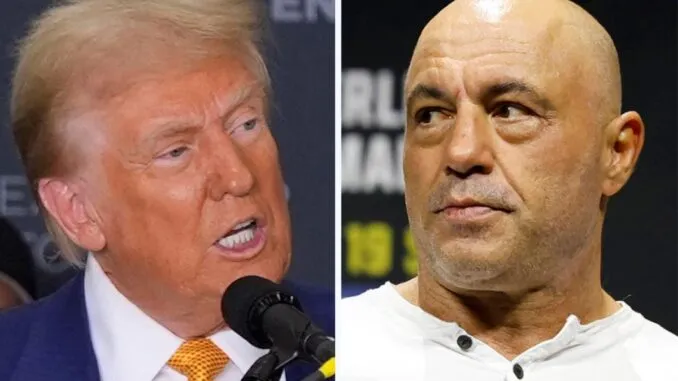TPV: YouTube is actively suppressing Joe Rogan’s recent interview with former President Donald Trump, making it harder for viewers to find and preventing it from trending despite massive viewership.
In an age when the internet is supposed to be a platform for free speech and open discussion, YouTube’s handling of conservative content is becoming a disturbing trend that raises serious questions about censorship, transparency, and the very notion of democracy.
For example, if you search “Joe Rogan Trump” on YouTube, good luck finding the massive viral interview between Rogan and Trump. It won’t pop up in the search results, even though the video received over 33 million views within two days.
The video was never allowed to appear on YouTube’s trending list, despite outperforming every video that did make it.
Instead, you have to go to Rogan’s channel and search through his many interviews to locate the interview. Can you imagine how many views the video would have garnered without YouTube’s election interference?
This is a form of political oppression. The fact that this video wasn’t allowed to trend despite its explosive popularity is baffling, and it’s hardly the first time YouTube has been accused of burying conservative content.
This lack of visibility has real consequences, especially when key voices and perspectives are essentially hidden from mainstream consumption.
Such suppression is more than frustrating; it’s a potential violation of free speech.
In 2020, various social media platforms were widely criticized for working closely with government agencies to filter information, particularly around election topics.
This collaboration raised alarms about whether social media companies were crossing a line and infringing on the First Amendment.
When platforms are shadowbanning and gatekeeping information—or worse, blocking it altogether—what does that mean for the democratic ideals of free speech and open discourse?
YouTube’s selective visibility practices warrant further investigation. This type of censorship is a slippery slope, and some question whether it’s a deliberate attempt to manipulate public opinion, especially on politically sensitive issues.
Ironically, those who loudly proclaim Trump as a “threat to democracy” may themselves be undermining democratic principles by selectively silencing voices and content that they disagree with.
The public deserves to see content fairly, regardless of political leanings. If we’re going to maintain a truly free and open society, we must hold platforms like YouTube accountable for restricting access to certain viewpoints.
